
The Holistic Approach to Hormonal Balance - Tips for Women of All Ages
Sania TariqHormones are a critical element of a woman's life, affecting everything from mood and energy levels to reproductive health and overall well-being. Achieving hormone harmony is essential for women of all ages, as imbalances can lead to uncomfortable symptoms and health issues. [1]
This blog explores the holistic approach to achieving hormone balance for women of all ages. Women can proactively manage their hormonal well-being by understanding the significance of hormonal health and implementing lifestyle changes. From nutrition to stress management, this comprehensive guide offers insights and practical tips for women on their journey to hormonal harmony.
Hormonal Changes Throughout a Woman's Life
Hormones are the silent orchestrators of a woman's life, exerting a profound influence from adolescence to menopause and beyond. Understanding these hormonal changes is crucial for maintaining health and well-being.

1. Puberty and Hormonal Fluctuations
The journey begins with puberty, marked by the onset of menstrual cycles. Hormones like estrogen and progesterone surge, triggering physical and emotional changes. Managing these fluctuations is essential for healthy development.
2. Menstrual Cycle and Hormonal Shifts
The menstrual cycle brings monthly hormonal shifts throughout a woman's reproductive years. Estrogen and progesterone levels rise and fall, affecting mood, energy, and fertility. [2] Knowledge of this cycle empowers women to anticipate and manage these changes effectively.
3. Pregnancy and Postpartum Hormones
Pregnancy introduces a complex interplay of hormones to support fetal growth. After childbirth, a woman's body undergoes further hormonal adjustments, influencing lactation and emotional well-being.
4. Perimenopause and Menopause
As women reach their late 40s and early 50s, they face perimenopause and menopause, characterized by major hormonal transitions. [3] Estrogen and progesterone decline, leading to various symptoms. Managing these changes holistically can alleviate discomfort and promote hormone harmony.
The Impact of Hormone Imbalance
Hormone imbalance can manifest through various distressing symptoms, affecting physical and emotional well-being. Recognizing these signs is key to addressing hormonal health. Common symptoms include;

- Irregular menstrual cycles
- Mood swings and irritability
- Fatigue and low energy
- Weight fluctuations
- Acne and skin issues
- Hair loss or excessive growth
- Insomnia or sleep disturbances
- Hot flashes and night sweats
- Decreased libido
- Vaginal dryness
- Memory and concentration problems
Furthermore, hormonal imbalances can contribute to various health conditions, such as;
- Irregular periods and cysts on the ovaries characterize Polycystic Ovary Syndrome (PCOS).
- Endometriosis - Causing severe pelvic pain and fertility issues.
- Thyroid Disorders - Hypothyroidism or hyperthyroidism affecting metabolism.
- Osteoporosis - Weakening of bones due to hormonal changes.
- Diabetes - Hormonal imbalances can impact insulin production.
- Menopause Symptoms - Flushing sensations, night sweats, and vaginal dryness.
Understanding the intricate link between hormones, mood, and health conditions is crucial for women to address these issues and seek appropriate care.
Holistic Approaches to Achieving Hormone Harmony
Hormone harmony is not solely dependent on medical interventions; various lifestyle choices can also influence it. Adopting a holistic approach to hormone balance involves making conscious decisions in different aspects of life. Let’s explore five key components of a holistic approach to achieving hormone harmony;

1. Diet and Nutrition
Diet plays a pivotal role in regulating hormones. Nutrient-rich foods can promote hormone balance, while poor dietary choices can lead to imbalances. A balanced diet should include;
- Fiber - Supports digestive health and aids in estrogen metabolism.
- Healthy Fats - Omega-3 fatty acids are paramount for hormonal health.
- Protein - Helps build and repair tissues, including hormone receptors.
- Vitamins and Minerals - Essential for hormone production and function.
- Limiting Sugar and Processed Foods - Excess sugar can disrupt insulin and other hormones.
2. Exercise and Physical Activity
Physical activity is more than just a way to stay fit; it directly impacts hormonal health. Regular exercise can help;
- Regulate Insulin - Enhances insulin sensitivity, reducing the risk of diabetes.
- Stimulate Endorphins - Improves mood and reduces stress-related hormones.
- Maintain Healthy Weight - Prevents excess fat, which can affect hormone balance.
- Promote Sleep - Supports a regular sleep-wake cycle, which is crucial for hormonal health.
3. Stress Management
Chronic stress can disrupt hormonal balance. Effective stress management techniques include;
- Mindfulness and Meditation - Calm the mind and reduce cortisol levels.
- Yoga - Combines physical postures, breathing, and meditation for stress relief.
- Time Management - Organizing tasks can reduce feelings of overwhelm.
- Social Support - Sharing concerns with friends and family can alleviate stress.
4. Sleep and Hormonal Health
A good night's sleep is essential for hormonal health. Proper sleep hygiene involves;
- Consistent Sleep Schedule - Helps regulate circadian rhythms.
- Creating a Relaxing Bedtime Routine - Signals the body that it's time to wind down.
- Limiting Screen Time - Exposure to screens before bed can disrupt sleep.
- Optimal Sleep Environment - A dark, quiet, and comfortable room promotes restful sleep.
5. Herbal Remedies and Supplements
Some herbs and supplements, like superfood blends, can aid in hormone balance when used cautiously and under supervision. Some others may include;
- Black Cohosh - Used for menopausal symptoms.
- Chasteberry (Vitex) - Helps regulate the menstrual cycle.
- Evening Primrose Oil - Used for hormonal acne and PMS.
- Vitamin D - Supports overall hormone function.
Incorporating these holistic approaches into daily life can contribute significantly to achieving hormone harmony. [4] However, individuals should consult with healthcare professionals before making major dietary or supplement changes to ensure they are appropriate for their needs and circumstances.
Lifestyle Adjustments for Hormone Harmony
Achieving hormone harmony also involves making mindful lifestyle choices to minimize exposure to hormone-disrupting chemicals. Many everyday products contain endocrine-disrupting chemicals, such as phthalates and parabens, which can interfere with hormone function. Opting for organic products and reducing the use of items containing these chemicals can significantly reduce exposure.

Moreover, creating a healthy lifestyle encompasses more than just diet and exercise. Maintaining a clean living environment, effective stress reduction techniques, and seeking social support can profoundly impact hormone balance. Establishing and maintaining a positive, stress-free environment at home and work is essential for sustaining hormonal equilibrium.
Lastly, hormonal health can change over time, and regular check-ups with healthcare professionals are vital in promptly detecting and addressing any imbalances or issues. This proactive approach ensures that hormonal changes are effectively managed, promoting long-term well-being and a life in harmony with one's hormones.
Conclusion
In conclusion, achieving hormone harmony is a holistic journey that women of all ages can embark on. From understanding the significance of hormonal balance to implementing lifestyle adjustments and seeking professional guidance, every step contributes to overall well-being.
By nourishing the body with the right nutrients, staying active, managing stress, and prioritizing quality sleep, one can pave the way to hormonal health. [5]
Incorporating organic products and periodic check-ups further fortifies this path. Remember, hormone harmony isn't an overnight achievement, but with patience and commitment, women can empower themselves to lead healthier, happier lives.
FAQs
- What is in the hormone harmony?
Hormone harmony typically refers to a balanced and healthy mix of hormones.
- Is there a natural way to balance female hormones?
Natural methods like diet, exercise, and stress management can help balance female hormones.
- What can I drink to balance my hormones?
Herbal teas like chamomile or green tea can aid in hormone balance when consumed regularly.
- How can women lower estrogen levels naturally?
Women can naturally lower estrogen levels through dietary changes, exercise, and stress management.
References
[2] https://www.bodylogicmd.com/blog/how-hormones-affect-energy-levels/
[3] https://www.health.harvard.edu/womens-health/perimenopause-rocky-road-to-menopause




